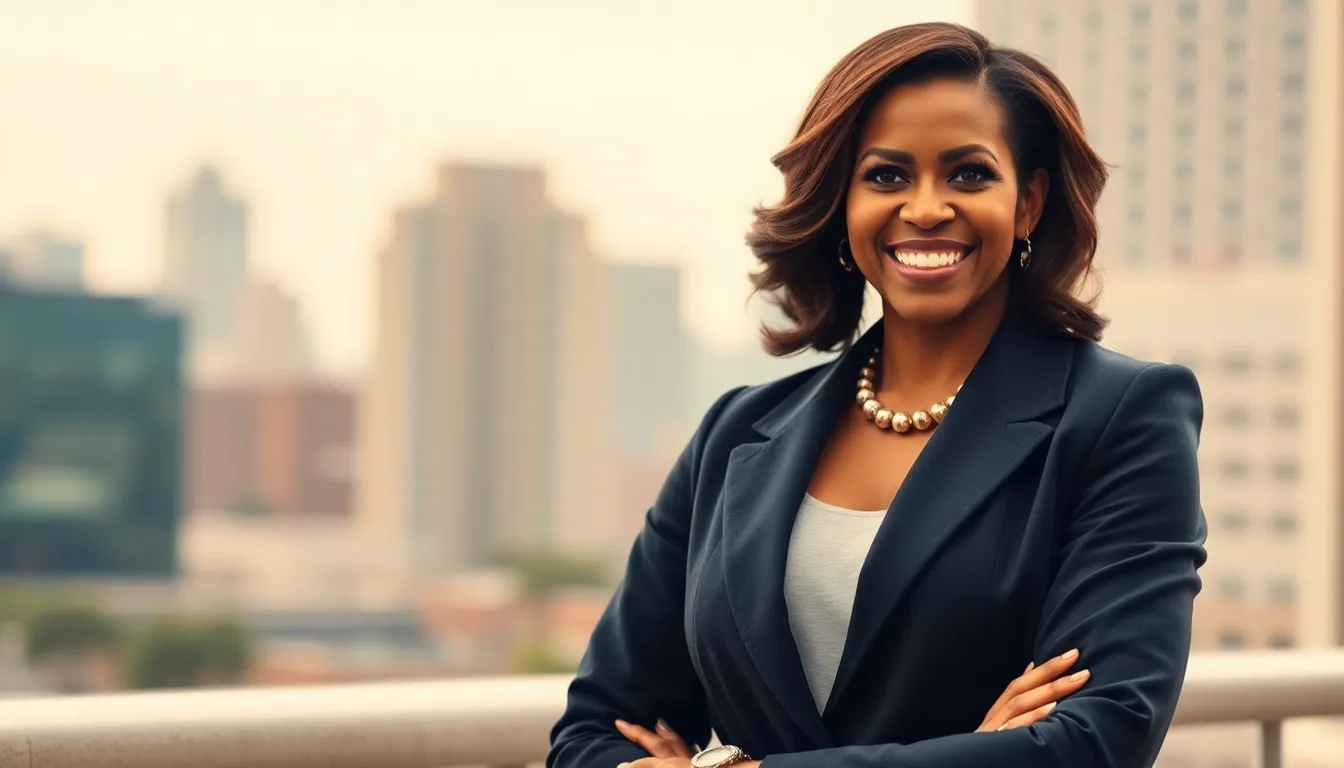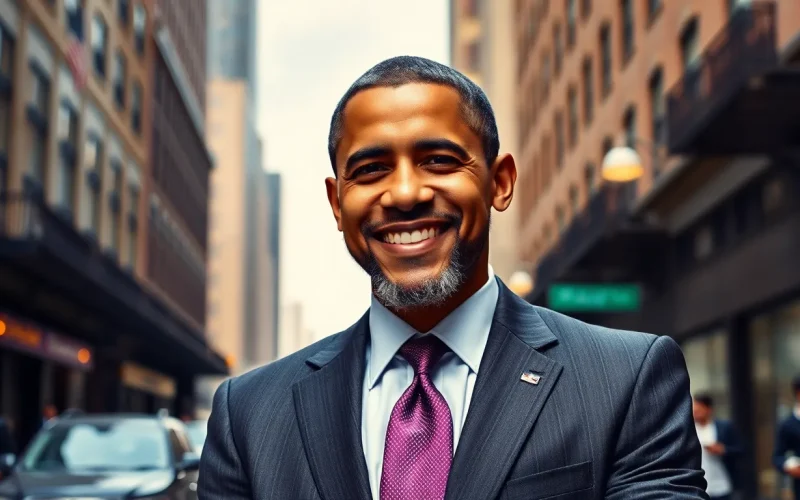Table of Contents
ToggleImagine a world where Michelle Obama traded her iconic style for a tailored suit and a well-groomed beard. It sounds like the plot twist of a quirky sitcom, but exploring the idea of Michelle Obama as a man opens a treasure trove of humor, insight, and social commentary. What if the former First Lady’s charisma and intelligence were packaged in a male persona?
This playful thought experiment invites readers to rethink gender roles and the impact of identity on public perception. From her powerful speeches to her advocacy for healthy living, envisioning Michelle in a different light challenges stereotypes and sparks laughter. Buckle up for a fascinating journey that blends wit with wisdom, all while celebrating the remarkable qualities that make her a beloved figure, no matter the gender she embodies.
Overview of Michelle Obama
Michelle Obama, born on January 17, 1964, in Chicago, Illinois, is an influential figure in American history. Known for her role as the First Lady of the United States from 2009 to 2017, she made significant contributions to various social causes. Advocacy for education, health, and military families stands at the forefront of her initiatives.
A graduate of Princeton University and Harvard Law School, Michelle cultivated a unique blend of legal and public service skills. Her experience includes working as an attorney for Sidley Austin and serving as the Vice President for Community and External Affairs at the University of Chicago Hospitals. Such roles helped shape her understanding of community issues.
Throughout her time in the White House, Michelle championed programs like “Let’s Move!” aimed at combating childhood obesity. Engaging children and families, she emphasized the importance of healthy lifestyles and nutrition. In addition, her “Reach Higher” initiative inspired young people to pursue higher education.
Michelle Obama is also a bestselling author, with her memoir “Becoming” published in 2018. The book gained critical acclaim, showcasing her journey, values, and the challenges faced while in the public eye. Her narrative resonates with countless readers, further solidifying her impact as a public figure.
Public speaking is another avenue where she excels. Michelle’s powerful speeches address themes of resilience and empowerment, fostering conversation about gender and race in contemporary society. Engaging audiences worldwide, she connects with individuals from diverse backgrounds.
Through her multifaceted involvement in philanthropy, education, and literature, Michelle Obama remains a symbol of strength and inspiration for many. Her legacy continues to evolve, influencing future generations.
Exploring Gender Identity


Exploring gender identity reveals complex layers of societal expectations. Historical perspectives shape contemporary understandings.
Historical Context
Society’s views on gender roles evolved throughout history. Patriarchal norms often relegated women to subservient positions. During early feminist movements, individuals challenged traditional gender expectations. These changes laid the foundation for more fluid representations of identity. Iconic figures like Joan of Arc and Virginia Woolf demonstrated gender nonconformity, prompting conversations on identity. Such historical contexts provide context for understanding modern discussions about gender.
Modern Perspectives
Current viewpoints on gender identity embrace greater inclusivity. Awareness around non-binary and gender fluidity has increased. Many individuals recognize how societal stereotypes influence perceptions of public figures. Feminist discourse now includes discussions on masculinity, challenging conventional definitions. Influential figures like Michelle Obama inspire conversations about the intersection of gender and leadership. Contemporary dialogues emphasize that gender influences not only identity but also societal expectations and representation.
Cultural Impact of “Michelle Obama as a Man”
This imaginative scenario invites exploration of cultural perceptions surrounding gender. Imagining Michelle Obama as a man provides a lens through which to analyze gender dynamics in leadership and media.
Literature and Media Representations
Different literary works and media portrayals often reflect societal attitudes toward gender. Some novels and films envision strong female characters adopting masculine traits to emphasize leadership. Such representations challenge traditional norms and showcase the versatility of women’s identities. Additionally, satirical works often use humor to address serious topics like gender stereotypes through male portrayals of prominent figures. Notably, Michelle Obama’s influence persists across various media channels, where her public image sparks discussions on gender fluidity and identity. These representations contribute to an ongoing dialogue about how society perceives individuals based on gender.
Public Reactions and Feedback
Responses from the public regarding the concept of Michelle Obama as a man vary widely. Some individuals embrace the idea, highlighting how it underscores the fluidity of gender roles. Others express discomfort, reflecting deeper societal challenges in accepting non-traditional representations. Social media platforms especially amplify these reactions, allowing diverse voices to engage in discussions on identity and perception. The dialogue reveals underlying biases, emphasizing that societal expectations often shape responses to gender portrayals. Ultimately, Michelle Obama’s legacy encourages reflection on public reactions and how they reveal broader cultural attitudes toward gender and leadership.
The Role of Gender in Leadership
Gender significantly influences leadership perceptions and expectations. Many studies indicate that society often associates certain traits with masculinity, like assertiveness and decisiveness, which are highly valued in leadership roles. Women in leadership positions frequently navigate challenges that arise from these stereotypes, particularly those surrounding their emotional expression and authority.
Public figures inspire discussions about gender through their leadership styles. For instance, Michelle Obama exemplifies how a strong female leader challenges norms traditionally linked to masculinity. Her advocacy and charisma resonate with audiences, illustrating the effectiveness of diverse leadership qualities.
Media portrayals shape public perceptions, highlighting narratives that reinforce or challenge gender roles. Female leaders sometimes adopt masculine traits to gain acceptance in a predominantly male environment. Literature and cinema often showcase female characters who exhibit traits typically seen as masculine, contributing to evolving conversations around gender identity and leadership.
Cultural attitudes towards gender and leadership remain complex. Some view a woman in a leadership position through a lens of skepticism, questioning her capabilities due to biases. Yet, those biases open avenues for discussion about the intersectionality of gender, race, and leadership styles.
Michelle Obama’s legacy reflects this dialogue, serving as a case study for understanding modern leadership dynamics. Her journey encourages individuals to reconsider the implications of gender in leadership roles. Observing how society reacts to female leaders like her reveals ongoing challenges and opportunities for progress in societal attitudes toward gender in leadership.
Imagining Michelle Obama as a man opens a dialogue about gender roles and societal perceptions. This thought experiment not only highlights her remarkable qualities but also underscores the complexities of identity in leadership. As a figure who has inspired many through her advocacy and achievements, Michelle’s legacy transcends gender.
The exploration of cultural attitudes surrounding gender continues to evolve. By challenging traditional norms and embracing diverse representations, society can foster a more inclusive understanding of leadership. This imaginative scenario serves as a reminder that strength and influence aren’t confined to gender, encouraging ongoing conversations about equality and empowerment in all spheres of life.




